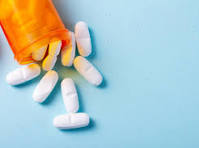The High Cost of Mental Health Medications and the Link to Crime: A Growing Concern
By Sheila Duncan
Reporter
As we all know in our community, when a family suffers a loss, it creates a ripple of sadness throughout. It’s something that’s hard to understand. We don’t always know the situation, what the person was going through, or if they tried to reach out for help. We don’t know how long it had been going on or if anything could have been done to prevent it.
I’ve had a loved one who couldn’t afford their medication, which led to a decline in their health and eventually to their death. What can we do for our friends and family members in such situations? It’s heartbreaking to think that if you need medication for a serious issue, like mental health or a heart condition, and can’t afford it, you’re just stuck. Taking the necessary medication as prescribed daily could have led to a different outcome. After viewing an article on AL.com about recent events in our county, I did a little research on Mental Health.
In recent years, the rising cost of mental health medications has become a significant issue in healthcare. As prices for these essential drugs continue to climb, many individuals find it increasingly difficult to access proper treatment. This financial barrier can lead to severe consequences, including the deterioration of mental health and a troubling increase in criminal behavior among those unable to afford their medications.
Mental health disorders such as depression, anxiety, bipolar disorder, and schizophrenia require consistent and effective treatment. Medications are often a critical component of these treatment plans, helping to manage symptoms and improve the quality of life for patients. However, the cost of these medications has been steadily increasing, putting a strain on patients and their families.
Several factors contribute to the high cost of mental health drugs:
Research and Development (R&D) Costs: Developing new medications involves significant investment in research, clinical trials, and regulatory approval. Pharmaceutical companies often pass these costs onto consumers to recoup their investments.
Patent Protections: Patents on new drugs grant pharmaceutical companies exclusive rights to sell them for a certain period, allowing them to set high prices without competition from generic alternatives.
Lack of Generic Options: Even after patents expire, the introduction of generic versions can be slow due to regulatory hurdles and additional patents on drug formulations or delivery methods.
Market Dynamics: Limited competition among drug manufacturers and the complexity of the pharmaceutical supply chain can lead to price markups at various stages.
The financial burden of expensive medications can be overwhelming for many patients. Those without adequate insurance coverage or financial resources often face difficult choices, such as skipping doses, reducing dosages, or foregoing treatment altogether. This lack of adherence to prescribed treatment regimens can lead to worsening symptoms, increased hospitalizations, and a decline in overall well-being.
The relationship between untreated mental illness and criminal behavior is complex. While it is important to avoid stigmatizing individuals with mental health disorders, research indicates that untreated or inadequately treated mental illness can increase the risk of criminal behavior in several ways:
Impulsive and Erratic Behavior: Mental health conditions like bipolar disorder or schizophrenia can lead to impulsivity, poor judgment, and erratic behavior, increasing the likelihood of engaging in criminal acts.
Self-Medication and Substance Abuse: Individuals with untreated mental health issues may turn to alcohol or illicit drugs to manage their symptoms, which can lead to addiction and associated criminal activities.
Economic Pressures: The inability to afford medications and maintain stable employment can drive individuals to commit crimes out of economic necessity or desperation.
Homelessness: Untreated mental illness is a significant factor in homelessness. Homeless individuals with mental health issues are more vulnerable to criminal victimization and may also engage in survival-related crimes.
To mitigate the high cost of mental health medications and reduce the potential link between untreated mental illness and crime, can these measures be considered?
Policy Interventions: Can Governments implement policies to control drug prices, promote the development of generic medications, and ensure affordable access to essential drugs.
Insurance Reforms: Maybe expanding insurance coverage and reducing out-of-pocket costs for mental health medications can make treatment more accessible.
Support Programs: Can programs be established that provide financial assistance, medication subsidies, or free drug distribution for low-income individuals that can help bridge the gap.
Integrated Care Models: Can integrating mental health services with primary care ensure early diagnosis and treatment and reduce the likelihood of untreated conditions leading to criminal behavior.
Public Awareness and Education: We need to continue to increase public awareness about the importance of mental health treatment and by reducing stigma we can encourage individuals to seek help and adhere to their treatment plans.
In conclusion, the high cost of mental health medications is a critical issue that demands urgent attention. Addressing financial barriers to treatment can significantly enhance the well-being of individuals with mental health disorders and reduce the potential for criminal behavior due to untreated conditions. Ensuring comprehensive and compassionate approaches is essential for providing everyone with the care they need and building a safer, healthier community for all. Let us continue to pray for those in our community who have lost family.


















